上海新世纪英语高二年级上学期第三单元 Sports Heroes教材精讲
文档属性
| 名称 | 上海新世纪英语高二年级上学期第三单元 Sports Heroes教材精讲 |
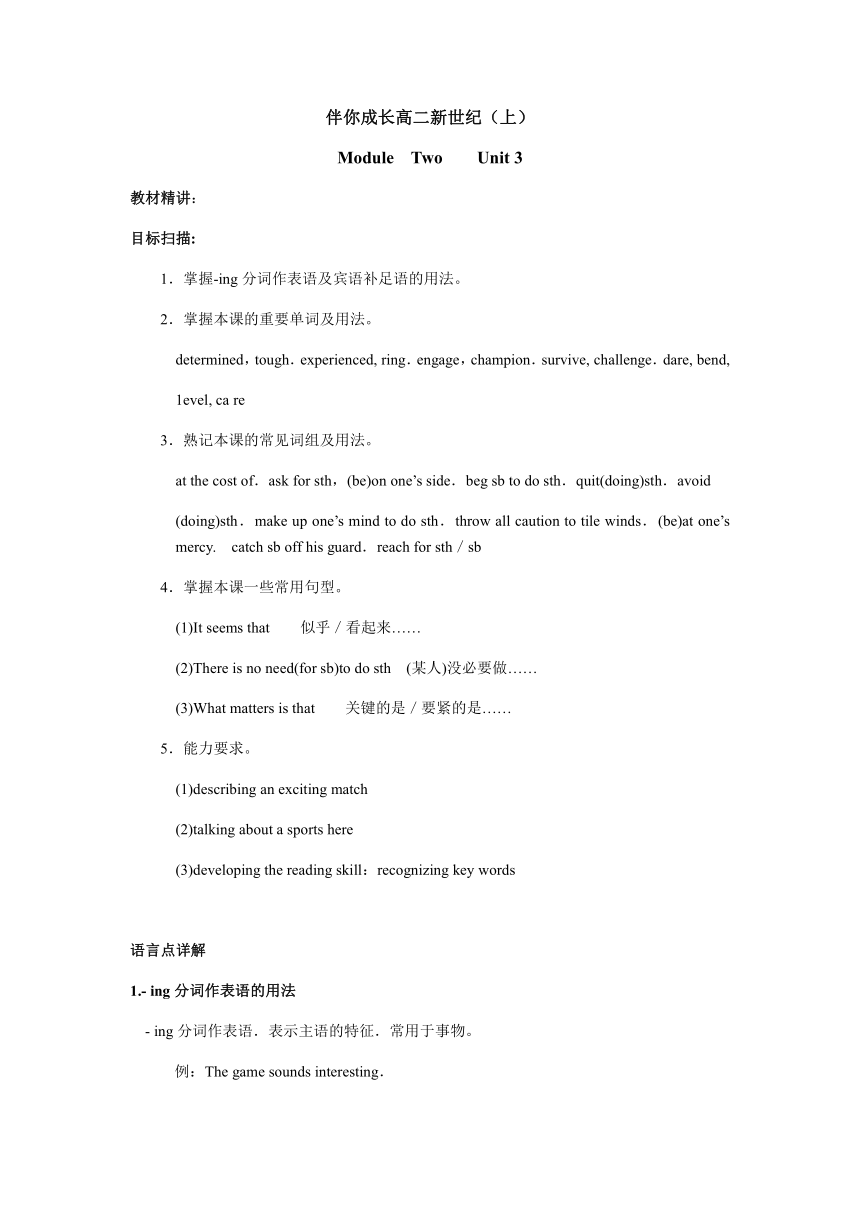
|
|
| 格式 | zip | ||
| 文件大小 | 99.0KB | ||
| 资源类型 | 教案 | ||
| 版本资源 | 上海新世纪版 | ||
| 科目 | 英语 | ||
| 更新时间 | 2019-12-21 18:01:47 | ||
图片预览

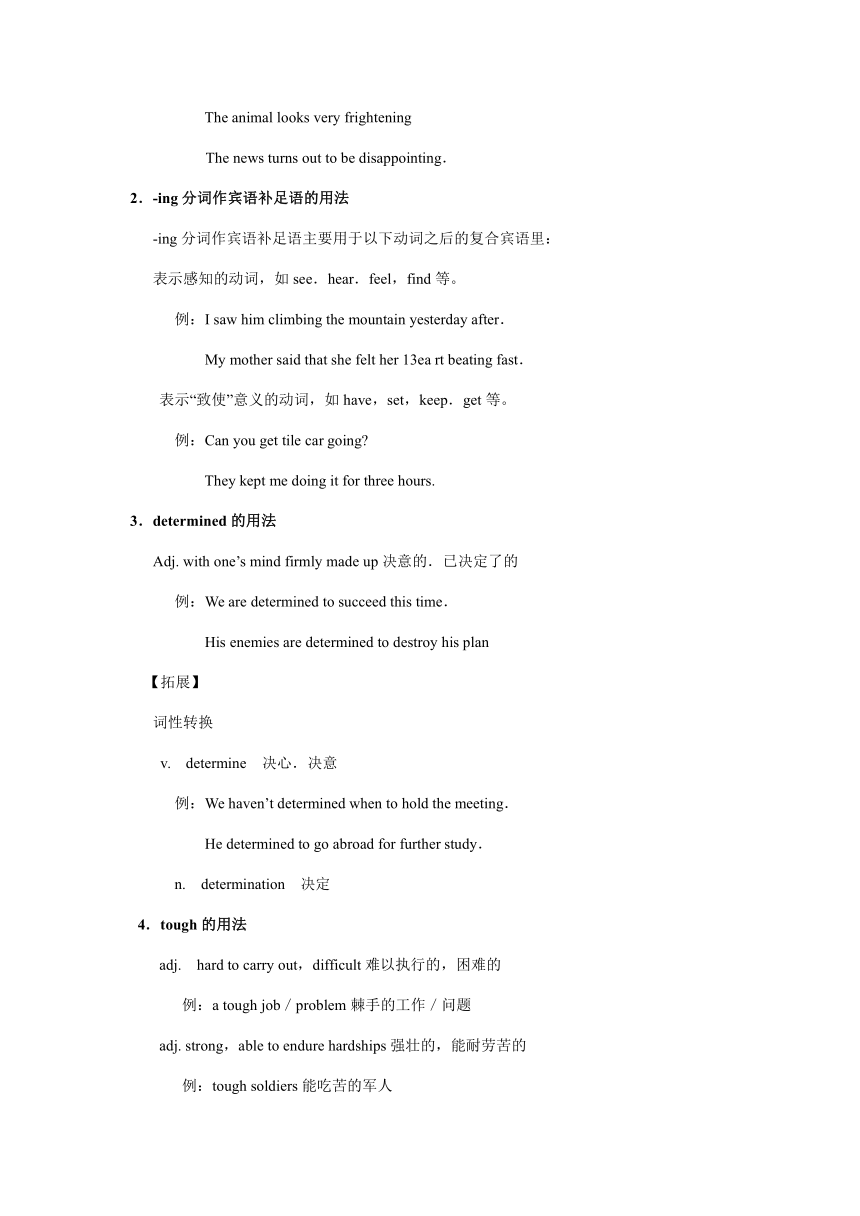
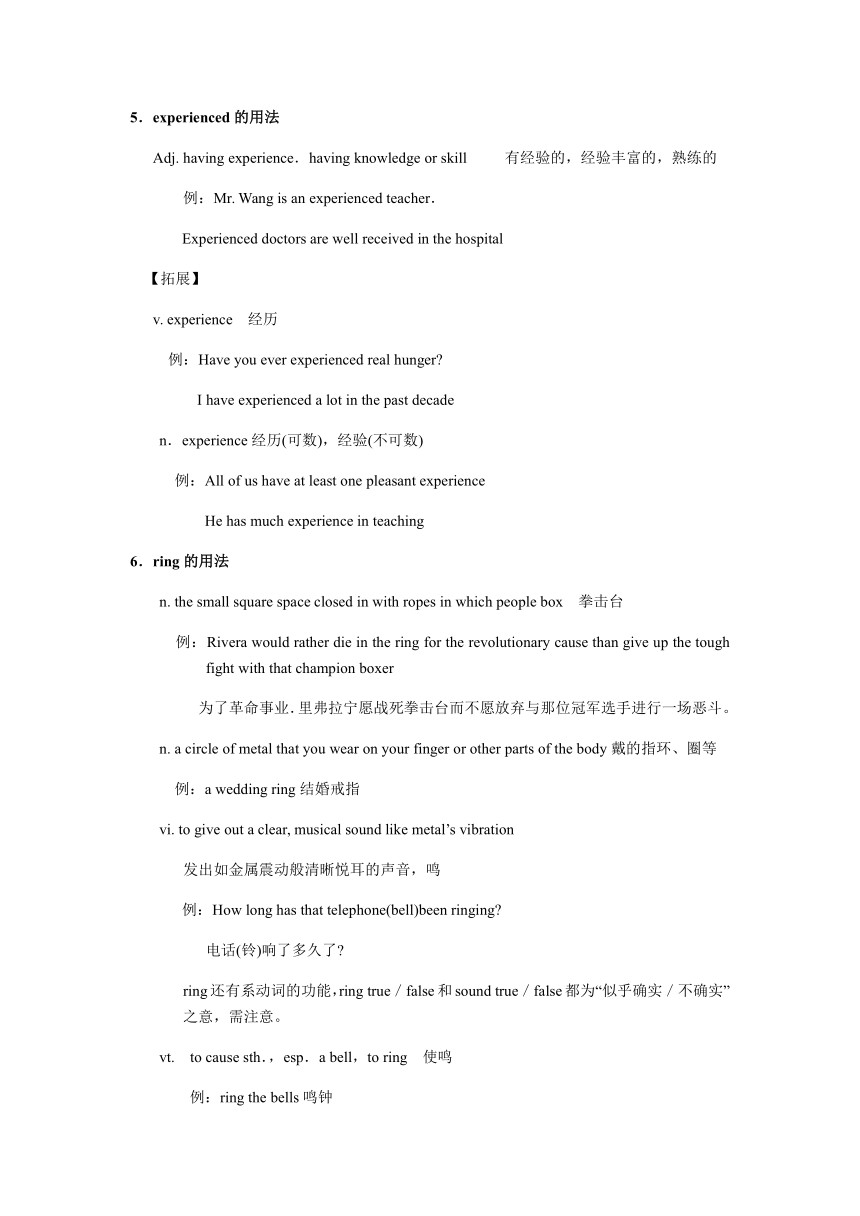
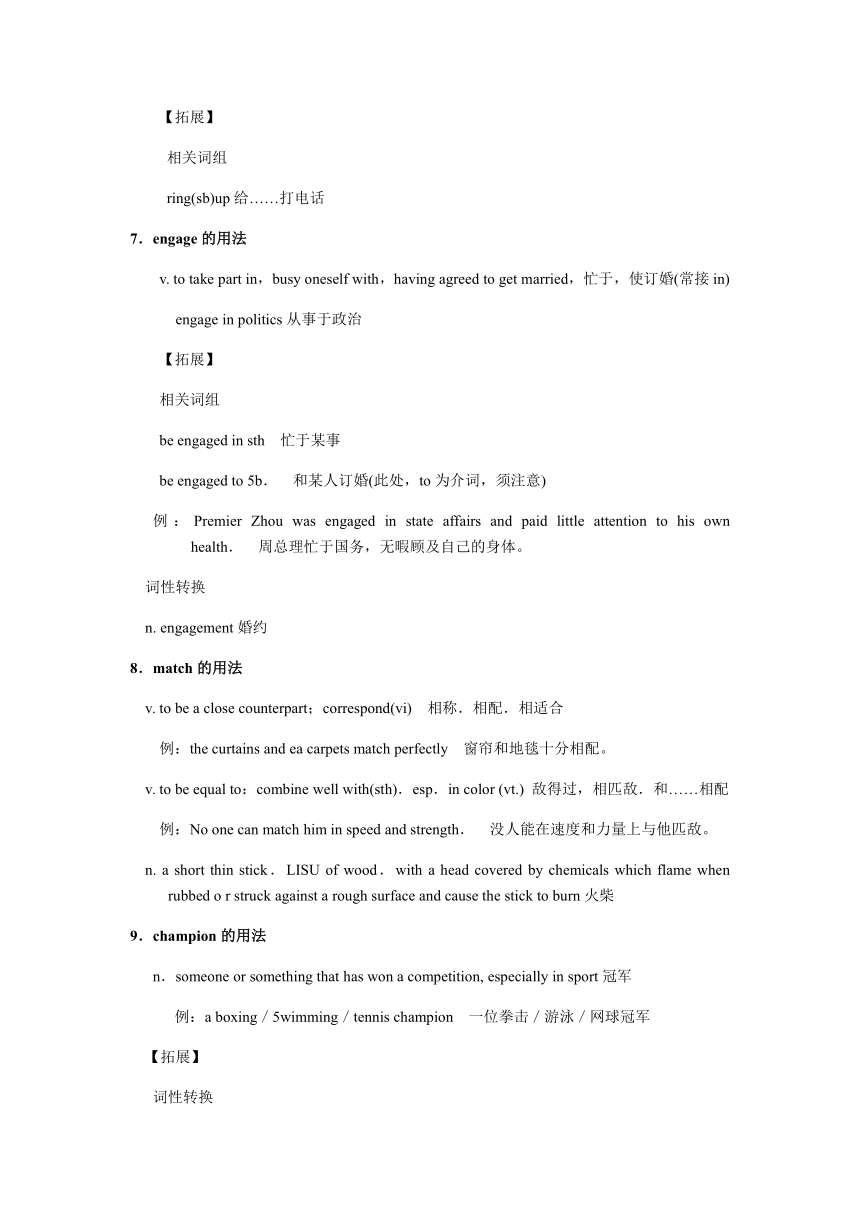
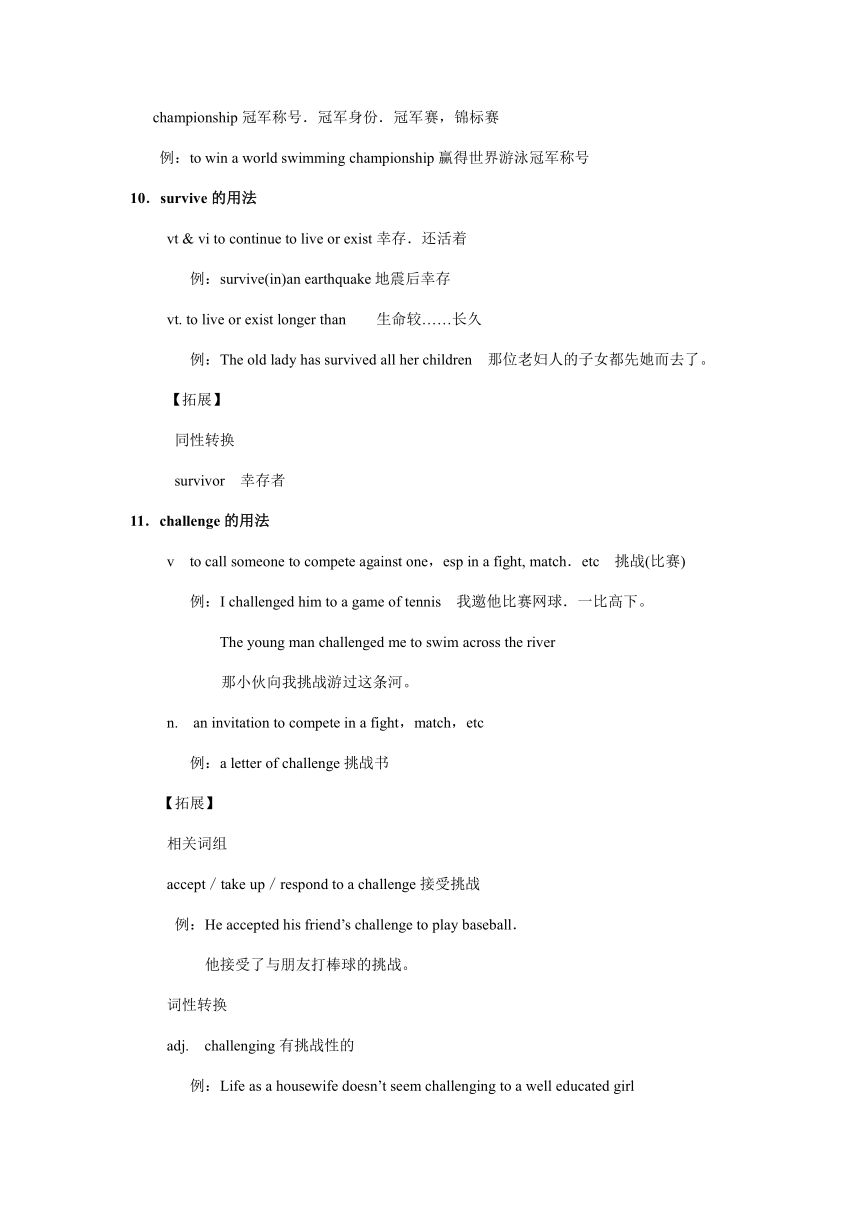
文档简介
伴你成长高二新世纪(上)
Module Two Unit 3
教材精讲:
目标扫描:
1.掌握-ing分词作表语及宾语补足语的用法。
2.掌握本课的重要单词及用法。
determined,tough.experienced, ring.engage,champion.survive, challenge.dare, bend,
1evel, ca re
3.熟记本课的常见词组及用法。
at the cost of.ask for sth,(be)on one’s side.beg sb to do sth.quit(doing)sth.avoid
(doing)sth.make up one’s mind to do sth.throw all caution to tile winds.(be)at one’s mercy. catch sb off his guard.reach for sth/sb
4.掌握本课一些常用句型。
(1)It seems that 似乎/看起来……
(2)There is no need(for sb)to do sth (某人)没必要做……
(3)What matters is that 关键的是/要紧的是……
5.能力要求。
(1)describing an exciting match
(2)talking about a sports here
(3)developing the reading skill:recognizing key words
语言点详解
1.- ing分词作表语的用法
- ing分词作表语.表示主语的特征.常用于事物。
例:The game sounds interesting.
The animal looks very frightening
The news turns out to be disappointing.
2.-ing分词作宾语补足语的用法
-ing分词作宾语补足语主要用于以下动词之后的复合宾语里:
表示感知的动词,如see.hear.feel,find等。
例:I saw him climbing the mountain yesterday after.
My mother said that she felt her 13ea rt beating fast.
表示“致使”意义的动词,如have,set,keep.get等。
例:Can you get tile car going?
They kept me doing it for three hours.
3.determined的用法
Adj. with one’s mind firmly made up决意的.已决定了的
例:We are determined to succeed this time.
His enemies are determined to destroy his plan
【拓展】
词性转换
v. determine 决心.决意
例:We haven’t determined when to hold the meeting.
He determined to go abroad for further study.
n. determination 决定
4.tough的用法
adj. hard to carry out,difficult难以执行的,困难的
例:a tough job/problem棘手的工作/问题
adj. strong,able to endure hardships强壮的,能耐劳苦的
例:tough soldiers能吃苦的军人
5.experienced的用法
Adj. having experience.having knowledge or skill 有经验的,经验丰富的,熟练的
例:Mr. Wang is an experienced teacher.
Experienced doctors are well received in the hospital
【拓展】
v. experience 经历
例:Have you ever experienced real hunger?
I have experienced a lot in the past decade
n.experience经历(可数),经验(不可数)
例:All of us have at least one pleasant experience
He has much experience in teaching
6.ring的用法
n. the small square space closed in with ropes in which people box 拳击台
例:Rivera would rather die in the ring for the revolutionary cause than give up the tough fight with that champion boxer
为了革命事业.里弗拉宁愿战死拳击台而不愿放弃与那位冠军选手进行一场恶斗。
n. a circle of metal that you wear on your finger or other parts of the body戴的指环、圈等
例:a wedding ring结婚戒指
vi. to give out a clear, musical sound like metal’s vibration
发出如金属震动般清晰悦耳的声音,鸣
例:How long has that telephone(bell)been ringing?
电话(铃)响了多久了?
ring还有系动词的功能,ring true/false和sound true/false都为“似乎确实/不确实”之意,需注意。
vt. to cause sth.,esp.a bell,to ring 使鸣
例:ring the bells鸣钟
【拓展】
相关词组
ring(sb)up给……打电话
7.engage的用法
v. to take part in,busy oneself with,having agreed to get married,忙于,使订婚(常接in)
engage in politics从事于政治
【拓展】
相关词组
be engaged in sth 忙于某事
be engaged to 5b. 和某人订婚(此处,to为介词,须注意)
例:Premier Zhou was engaged in state affairs and paid little attention to his own health. 周总理忙于国务,无暇顾及自己的身体。
词性转换
n. engagement婚约
8.match的用法
v. to be a close counterpart;correspond(vi) 相称.相配.相适合
例:the curtains and ea carpets match perfectly 窗帘和地毯十分相配。
v. to be equal to:combine well with(sth).esp.in color (vt.) 敌得过,相匹敌.和……相配
例:No one can match him in speed and strength. 没人能在速度和力量上与他匹敌。
n. a short thin stick.LISU of wood.with a head covered by chemicals which flame when rubbed o r struck against a rough surface and cause the stick to burn火柴
9.champion的用法
n.someone or something that has won a competition, especially in sport冠军
例:a boxing/5wimming/tennis champion 一位拳击/游泳/网球冠军
【拓展】
词性转换
championship冠军称号.冠军身份.冠军赛,锦标赛
例:to win a world swimming championship赢得世界游泳冠军称号
10.survive的用法
vt & vi to continue to live or exist幸存.还活着
例:survive(in)an earthquake地震后幸存
vt. to live or exist longer than 生命较……长久
例:The old lady has survived all her children 那位老妇人的子女都先她而去了。
【拓展】
同性转换
survivor 幸存者
11.challenge的用法
v to call someone to compete against one,esp in a fight, match.etc 挑战(比赛)
例:I challenged him to a game of tennis 我邀他比赛网球.一比高下。
The young man challenged me to swim across the river
那小伙向我挑战游过这条河。
n. an invitation to compete in a fight,match,etc
例:a letter of challenge挑战书
【拓展】
相关词组
accept/take up/respond to a challenge接受挑战
例:He accepted his friend’s challenge to play baseball.
他接受了与朋友打棒球的挑战。
词性转换
adj. challenging有挑战性的
例:Life as a housewife doesn’t seem challenging to a well educated girl
对于受过良好教育的女孩来说做家庭主妇似乎不太难。
12.dare的用法
与need一样,dare既可州作情态动词.电可用作实义动词。
用作情态动词时,它如同其他情态动词can, may, will, shall一样也有过去式.即dared,后跟不带to的不定式。在用于否定句和疑问句时,不借助do。
例:She dared not answer.
M r.Holmes.I dare not sleep in that room again.
福尔摩斯先生,我再也不敢在那个房间里睡觉了。
How dare you say such a thing? 你怎么敢说这种话呢?
Now l joke and say to everyone that I dare tell my manager exactly what I think of him.
现在我常常对大家开玩笑说,我敢于把对经理的看法如实地对他说。
用作实义动词时,它有动词的所有形式,即第三人称单数dares.现在分词daring和过去分词dared.后跟带to的不定式,可以用于一切句式。
例:He dares to behave like that in my house 他竟敢在我家里这样放肆。
He does not dare to fight 他不敢打架。
l have never dared to disturb you. 我从来不敢打搅你。
13.bend的用法
v to(cause to)slope o r lean away from an upright position(使)倾(身),弯曲
例:He bent over(down)to tie his shoes 他俯下身去系鞋带。
【拓展】
相关词组.
bend over弯过来 bend down弯下来
bend forward向前倾 bend back向后倾
v. to(cause to)be forced into or out of a curve or angle弯曲.使成弧形或角
例:bend the wire把金属线弯曲
(fig)He is very firm about it I cannot bend him.
(比喻)他对那件事很固执,我无法改变他。
14.1evel的用法
v to direct at sth.or sb.and overcome or defeat it or him 夷平,毁坏.击倒
例:level a building to the ground把建筑物夷为平地
The blow levelled him to the earth 他被击倒在地。
n. general standard,quality.or degree 一般标准性质或程度
例:I have done my best to keep level with the latest results of foreign investigation.
我已尽力与国外研究的最新成果保持同等水平。
15.care的用法
v. to like;to want喜欢.要,欲
例:l don’t care to play football I’d rather go for a walk.
我不喜欢踢足球,我宁愿去散步。
v. to mind:to be worried,anxious,or concerned (about) 关心.操心.顾虑
例:When his mother died, Allan didn’t seem to care at all.
艾伦妈妈去世时,艾伦似乎一点也不在乎。
n.charge,protection,responsibility照料,保护·责任
例:The patient is now under the doctor’s care,这位病人现在处于医生照料中。
n. serious attention,effort 用心.努力
例:You must do your work with more ca re if you want to be succes5ful.
你要成功的话,一定要用心做事。
n. carefulness in avoiding harm, damage, etc 小心,谨慎
例:Glass! Handle with care. 玻璃!小心搬运。
16.at the cost of 以……为代价
例:He 5aved his daughter from the fire(but)at the cost of his own life
他牺牲了生命,把女儿从大火中救出来。
(注意有无but的语气的细微差别)
cost sb sth 让某人付出某种代价
例:Your crime will cost you your life 你的罪行将使你付出生命的代价。
17.ask for的用法
to make a request for sth.or to sb 请求某事.央求某人
例:Young Tom went to the teachers’ office to ask(the teacher)for help
·to behave so as to cause something bad招致(某种恶果)
例:If you climb mountains in misty weather,you are really asking for trouble.
如果你在大雾天去爬山,你真是自找麻烦。
18.(be)on one’s side 支持某人
例:Your opinions don’t make much sense Whose side are you on in this question?
你的意见没多大道理。对于这个问题,你支持谁?
【拓展】
相关词组
side by side并肩
例:The two lovely brothers walked to the supermarket side by side.
可爱的两兄弟并肩前往超市。
19.beg sb.to do sth.
乞求某人做某事
例:May I beg (of)you to do it for me? 可以请你为我干这件事吗?
【拓展】
相关词组
beg from door to door挨家挨户乞讨
beg a favor of sb/beg sb.for a favor请求某人帮助
beg for mercy/peace乞求施舍/和平
20.quit(doing)sth.
放弃做……
例:quit smoking戒烟
quit的过去式、过去分词有两种,即quitted或quit.而以后面一种更常用。21.avoid(doing) sth. 避免(做)某事
例:We must try to avoid (making)the same mistake next time.
已学过的与avoid有关的词有:avoidable(可避免的)和unavoidable(同义词为inevitable,意思是“不可避免的”)
22.throw all caution to the winds 不顾一切,毫无顾忌
例:After looking around for a while,the thief found nobody, so he began to throw all caution to the winds.
环顾四周,小偷发现没人,就开始肆无忌惮起来。
23.(be)at ore’s mercy的用法
·听任摆布,和(be)at the mercy of sb同义
例:Primitive man was at the mercy of his environment 原始人受其所处环境的支配。
mercy为常用词,和它有关的其他词组为:
have mercy on sb和show mercy to sb都为“对某人表示同情(或怜悯)”之意思。
例:He showed mercy to his enemies and let them live,
他对敌人表示宽大,饶了他们的性命。
24.catch sb.off his guard
攻其不备,趁其不意
例:The police,catching the criminal off his guard, arrested him as he was drinking in a public house.
罪犯在酒店里喝酒.警察趁其不备把他逮住了。
25.reach for sth.
伸手去拿/抓某物或某人
例:The shopkeeper reached for a packet of tea. 店主伸手拿了一包茶叶。
26.mind的用法
make up one’s mind to do sth 打定主意/下决心做某事
例:He made up his mind not to say a word 他打定主意一句话也不说。
【拓展】
相关词组
concentrate one’s mind on sth. 集中思想于某事
read one’s mind看出某人心思
mind 作动词,有“介意”的意思,用法比较单一,这里不作讲解。
活学活用 :
◆1翻译:这场足球赛非常令人兴奋。
◆2选择正确的词:The speech he made yesterday is ________ (encouraged/encouraging).
◆3翻译:昨晚10点,我发现儿子在玩电子游戏机。
◆4选择:We were very sorry to have kept you __________for two hours this morning.
A wait B.waited C.waiting D are waiting
◆5翻泽:中国足球队决心赢得下一场比赛的胜利。
◆6选择:The task was full of challenge, but many of them wanted to undertake it.
A easy B.simple C.tough D.ordinary
◆7 选择正确的词:He has worked for twenty years.And,of course,he has a
lot of ______________ (experience/ experiences).
◆8翻译:我爷爷经历过第二次世界大战。
◆9完成句子:We must form the habit of ______________ (摁门铃)or knocking at the door before going into others’ apartment.
◆10. 翻译:去年他们登报宣布订婚,而此刻他们正忙于婚礼仪式的筹备。
◆11选择:That sweater of yours looks nice.but I don’t think its color _____your trousers
A .goes B .serves C.matches D .fits
◆12 选择正确的词:________ (Champion/Champagne)as Ruo Xuejuan is,she is easy- going as usual.
◆13选择:The young boy miraculously (奇迹般的)__________in the ship-wreck
A . lived B survived C revised D arrived
◆14词形转换:The job is doubtedly a nice offer,but it is _______ (challenge)as well.
◆15选择:1 wonder how he ______that to the boss.
A dare to say B dare saying C not dare say D dare say
◆16翻译:这条路在那儿突然向右转弯。
◆17.翻译:那座山海拔4,500 米。
◆18选择:She took ________to avoid catching cold
A notice
B attention
C charge
D.care
◆19选择:The dictionary is said to have _____ 75 yuan.
A. paid B. spent C. taken D. cost
◆20翻译:我受够了,所以我辞职了。(quit)
◆21.翻译:The hotel is within easy reach of beach.
◆22.选择:It’s dark outside. _______ your steps while walking downstairs.
A. Take B. Mind C. Care D. Keep
课后精炼:
Listening
1. Listen to the short conversation and decide the best answer to the question you have heard.
(1) A. There was something wrong with her car. B. She was lost on her way.
C. Her car was held up on the highway. D. She was too tired to walk.
(2) A. 9:30. B. 9:40. C. 9:20. D. 9:50.
(3) A. She doesn't want to ask Mr. Jones herself. B. Mr. Jones might fix the radio.
C. Mr. Jones may have broken the radio. D. She doesn't want to work for Mr. Jones.
(4) A. To write to her. B. To say "Hello" to his wife.
C. To buy her some nice things. D. To post her some friendship tokens.
(5) A. Shirts. B. A pair of football boots.
C. A sweater.
D. A pair of imported gloves.
2. Listen to the passage and decide the best answer to the question you have heard.
( 1) It means that______.
A. he is born stupid
B. both his father and mother must have poor memory too
C. he doesn't use his brain enough
D. he is just unlucky
(2) A. Sitting in a chair or a car all day will make your memory fail.
B. Practise remembering can give you a strong body.
C. Your legs and arms will slowly become weak if they are not used.
D. Anyone can become very clever if he practises remembering hard.
(3) A. They are fond of remembering as many things as possible.
B. Their weaknesses force them to remember things, or they'll get into trouble.
C. They are born clever.
D. They are not willing to write things down in a notebook.
3. Listen to the longer conversation and fill in the blanks .
What happened to the hotel one day? There was a (1)
Why shouldn't the man open the door? Because of the (2)
How did the speakers decide to get out of the window? Why?(3) out of the window, because they were on the (4) floor.
Complete the form. Write ONE WORD for each answer.
Grammar and Vocabulary
1. In her story, she mentioned something_______.
A. frighten B. frightened C. frightening D. is frightening
2. Mr. Wang is said to have lived in that English ______country for 3 years and his ______English is pretty good.
A. speaking, speaking B. spoken, speaking
C. spoken, spoken D. speaking, spoken
3. Now Chinese is one of the foreign languages______ in some high schools in the USA.
A. teaching B. to be taught C. being taught D. to be teaching
4. On a ______morning, the little match girl was found ______at the street corner.
A. frozen, frozen B. freezing, freezing
C. frozen, freezing D. freezing, frozen
5. I feel it's a great honor ______to attend the opening ceremony of the new joint venture.
A. to invite B. of being invited C. to be invited D. having invited
6. ______with video tape-recorders, color TV sets _______better.
A. Compared, sell B. To compare, will sell
C. Comparing, is sold D. Being compared, sell
7. All the teams have agreed ______the match on Thursday evening.
A. played B. to play C. playing D. for playing
8. The police tried to calm the ______audience but failed.
A. excite B. exciting C. excited D. having excited
9. I am fully occupied now, so I can't help ______your bicycle.
A. repairing B. to repair C. repaired D. being repaired
10. They don't allow ______on the campus.
A. gambling B. to gamble C. gambled D. being gambled
9. I am fully occupied now, so I can t help ______your bicycle.
A. repairing B. to repair C. repaired D. being repaired
10. They don't allow ______on the campus.
A. gambling B. to gamble C. gambled D. being gambled
11. Many people hold the belief that most wives ______their husbands.
A. survive from B. are survived C. survive D. survive than
12. At the ______of the gun, the runners dashed from the starting points.
A. sound B. hearing C. shot D. sight
13. All my classmates jumped with joy ______they heard the news that I had won the first prize in the maths contest.
A. the instant when B. the instant
C. the instant that D. the instant at which
14. With a lot of difficult problems______, the newly-elected premier is having a hard time.
A. to settle B. settled C. settling D. being settled
15. in a debate, one must manage to _______oneself by catching one's opponent's weak points.
A. protect B. recover C. benefit D. defend
Close
The Metropolitan Railway in London was the world's first underground railway. It 1 in 1860. 2 then, the streets of London were 3 busy that it was difficult to travel around. An underground railway was 4 in 1843,and there was a lot of talk about the new idea. The govern?ment at last gave permission 5 the building of it in 1853. So, one day in 1880. 6 workers arrived in various areas. They first broke up the road, and then dug a 7 wide trench ($i), 8 the road had been. The trench was covered with a roof, which carried the new street on top. it 9 into the tunnel for trains. This 10 the "cut-and-cover" method of building an under- ground railway
.
1. A. used to begin B. was begun C. had begun D. was beginning
2. A. Even if B. Just C. Only D. Even
3. A. very B. too C. much D. so
4. A. suggested B. insisted C. demanded D. commanded
5. A. for B. to C. with D. in
6. A. a good many of B. a great deal of
C. several hundred D a large amount o
7. A. deeply B. deep C. depth D. deepened
8. A. which B. that C. where D. what
9. A. shaped B. formed C. turned D. became
10. A. means B. shows C. is regarded D. is called
Reading
(A)
Think for a moment about the teachers you have had at school or at university. Which one did you like best? And why? Were the teachers you liked best also the ones who were the best qualified for the work?
Some very common answers to this question are that teachers need to love their students, that they need to have an expert knowledge of their subjects, and that they should devote themselves completely to their jobs. All of these ideas are, of course, true to a certain extent but they are perhaps a little too simple.
It is impossible for anyone to love everyone they know, and teachers deal with a very large number of students over the years. On the other hand, teachers should certainly be able to make their students feel that they are interested in them as people and in the development of both their brains and their character. A deep knowledge of the subject is extremely important, but equally important is the ability to pass that knowledge on to the students effectively—a teacher needs to be trained in the skills of teaching. These skills include how to explain ideas in a clear way, how to help students to use the knowledge they are given, how to control a class, and so on. Finally, teachers have to devote a lot of time and energy to their work, of course. However, they are also models that their students must follow, so it is important that they should be well-balanced people with interests outside their school work—family, friends, hobbies, etc. A teacher who only lives for work is likely to become loo narrow-minded.
1. The writer suggests that you think about your teachers at school or university so that______.
A. you may remember them better
B. you may select outstanding teachers
C. you may learn from the outstanding teachers
D. you may know the qualities for outstanding teachers
2. The writer does not consider it possible for a teacher______.
A. to love all the students he has taught
B. to be an example for his students to follow
C. to have a good command of the subjects he teaches
D. to pass his knowledge on to the students effectively
3. In the sentence "... teachers should certainly be able to make their students feel that they are in?terested in them as people. . . " in the third paragraph, "they" and "them" refers respectively to
A. teachers and teachers B. students and teachers
C. teachers and students D. students and students
4. A well-balanced person is one______.
A. who has interest both in and outside his work
B. who devotes all his time and energy to his work
C. who has interest neither in nor outside his work
D. who devotes most of his time and energy to his family, friends and hobbies
5. It can be concluded from the passage that______.
A. even if a teacher has a good knowledge of his subject, he cannot be a good teacher if he does not have the ability to pass that knowledge on to his students
B. it is unnecessary for teachers to spend much time and energy on their work if they do have an expert knowledge of their subjects
C. teachers should be trained to love all of their students they are teaching or have taught
D. most teachers are born with such skills as how to explain an idea clearly
(B)
In 1974, the price of petrol in Britain rose by 129 percent; cars became expensive to run and train and bus fares increased. People who hadn't used a bike since they were children decided that they would buy one. They discovered that biking could be enjoyable—and cheap.
Bike sales had been falling for many years—but suddenly everything changed. In 1975, British people spent more than 1 million pounds on bikes. Bike traffic increased by 11 percent.
Bike fans compare cost of running a car with the cost of running a bike. They say bike-riding is a good form of exercise. In towns bikes can often be faster than cars and buses. The biker can ride through traffic blocks and at the end of his journey he doesn’t have to look for a parking space. Biking through the countryside is a real pleasure: the biker has time to see things that the motorist, driving at over 100 kilometres an hour, never sees.
But in the cities, biking can be dangerous. You need all attention and strong nerves, especially when a truck or a bus is trying to pass you. Since biking became popular again, there has been an increase in the number of accidents.
Bikers say the answer to the problem is to separate bikes from other traffic. Stevenage, a new town near London, has a system of "bikeways", where only bikers are allowed to travel. However, in most towns, say bikers, the needs of the bike rider are overlooked. Bikers have formed into "action groups" in many towns in Britain. They want to persuade local departments—who are in charge of the roads and traffic in their areas—to make sure there are safe equipments for bikers. Or, they say, interest in biking will die.
1. Today the British want to ride bikes because______.
A. trains and buses are too crowded
B. the cost of riding bikes is much cheaper than that of taking trains or buses
C. there are a lot of thieves on the trains or in the buses
D. the traffic accidents easily happen while people go to work by train or by bus
2. What is special about traffic in Britain today?
A. More and more people ride bikes.
B. More and more people like to take trains.
C. Taking train is much safer than taking buses.
D. No people like to take buses.
3. The main reason for so many people's riding bikes in England is that______.
A. bike-riding does good to people
B. a bike is easy to take care of
C. a bike is much cheaper than a car
D. there is no need of a parking place for a bike
4. Riding bike has many strong points, but when it becomes popular______.
A. a lot of bikes will be crowded in the public places
B. there will easily be more and more traffic accidents
C. less and less people will take a train
D. a lot of bus-drivers and trainmen are out of work
5. The underlined word "they" in the last sentence of the last paragraph refers to______.
A. public B. officials C. bike riders D. bus-drivers
Verbs
1. It ____________ (be) a long time before I see another foreign film.
2. Up to now air pollution______(do) great harm to human beings.
3. We_______(mean) to pay him a visit yesterday, but we were too busy.
4. I______(tell) that all the tickets had been sold out.
5. The headmaster promised that the school_______(supply) the poor students with food, books and anything else.
6. Tom looks worried. He seems______(lose) something important.
7. ______(be) there many times, he offered to be our guide.
8. They require the meeting______(bring) to an end as soon as possible.
9. The poor lady did all this for the rich family without______(pay).
10. The Grand Exhibition Hall, ______(build) by a great many workers and engineers in Shanghai, has become a place of interest.
Word Transformation
1. As to the______(survive) of the earthquake, the Red Cross will try every means to offer them financial support.
2. With time going on, the young manager will become more______(experience).
3. Tom's______(refuse) implied that he was unwilling to go there with us.
4. Teaching as a job is ______(demand) and time-consuming, so only a small number of young graduates would choose it as a lifetime career.
5. The spy was_______(fool) this time. He was cheated by his counterpart.
6. Theft is likely if you leave your bike______ (attend).
7. You are likely to learn English well after______(repeat) failure.
8. Bird flu, a_______(die) disease, is frightening, and up to now no scientists have developed any medicine to get rid of it.
9. The lecture seemed_______(end), and the audience was growing more and more impatient.
10. Tom is now studying abroad alone. Sometimes he feels a bit _______ (helpful) when meeting with difficulties.
Translation
1昨天下午两点,我发现张健和李毅在学校操场上打篮球。(现在分词作宾补)
2.他们已下定决心把语文和英语学好。(make up one’s mind)
3这场大火中只有他和弟弟幸免于难。(survive)
4那只可怜的狐狸牺牲了一条腿但逃脱了陷阱。(at the cost of)
5乘守门员未防备之时.戴维冷不防攻进了制胜的一球。(catch sb, off one’s guard)
Module Two Unit 3
1. The football match was very exciting.
2. encouraging
3. At ten last night, I found my son playing video games.
4. C
5. The Chinese Football Team are determined to win the next match.
6. C
7. experience
8. My grandpa experienced World War fl.
9. ringing the doorbell
10. Last year they announced their engagement in the newspapers and now they are engaged in the prep?aration of the wedding ceremony.
11. C
12. Champion
13. B
14. challenging
15. D
16. The road bends there sharply to the right.
17. The mountain is 4.500 metres above sea level.
18. D
19. D
20. I'd had enough, so I quit.
21. JiJtJ]6filB§S?i*?ifi.
22. B
Listening
1. (1) A (2) B (3) B (4) A (5) C K
2. (DC (2) C (3) B
3. (1) fire (2) smoke (3) Climbing (4) ground Grammar and Vocabulary
1. C 2D 3. C 4. D 5. C 6. A 7. B 8. C 9. B 10. A 11. C 12. A 13. B 14. A 15. D Cloze
1. B 2D 3. D 4. A 5. A 6. C 7. B 8. C 9. C 10. D
Reading
(A) 1. D 2. A 3. C 4. A 5. A
(B) 1. B 2. A 3. A 4. B 5. C
Verbs
1. is/will be 2. has clone 3. had meant 4. was told 5. would supply 6. to have lost 7. Having been 8. (should) be brought 9. being paid 10. built Word Transformation
1. survivors 2. experienced 3. refusal 4. demanding 5. foolish 6. unattended 7. repeat?ed 8. deadly 9. endless 10. helpless Translation
1. I found Zhang jian and Li Yi playing basketball on the school playground at two yesterday after?noon.
2. They have made up their minds to learn Chinese and English well.
3. Only he and his younger brother survived (in) this fire.
4. The poor fox escaped from the trap at the cost of one of its legs.
5. David caught the goal-keeper off his guard, and scored a goal that was decisive in winning the match.
